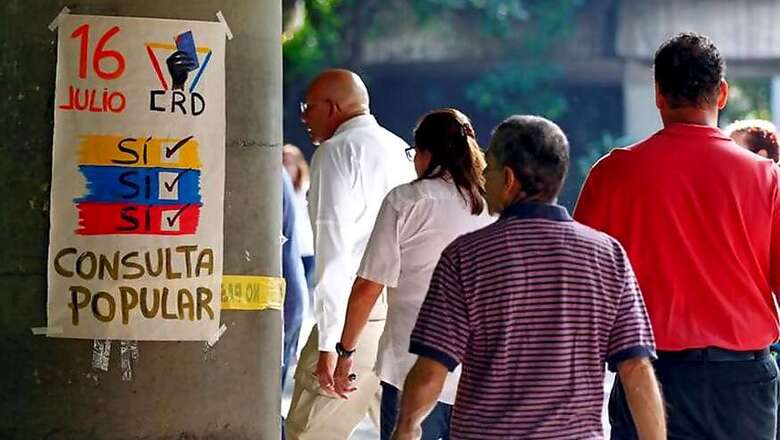
views
Caracas: More than 7 million Venezuelans voted in Sunday's unofficial referendum held by the opposition to heap pressure on President Nicolas Maduro and repudiate his plan to rewrite the OPEC nation's constitution, monitors said.
The symbolic plebiscite was aimed at denting Maduro's legitimacy further amid a crippling economic crisis that has left millions struggling to eat and months of anti-government unrest that has killed nearly 100 people.
Opposition leaders hailed it as a success, while also mourning the death of one woman killed by gunmen in Caracas during the voting.
"Today, July 16, dignity won and tyranny lost," said opposition leader Maria Corina Machado. "We have given an indisputable mandate for a new Venezuela starting tomorrow."
Maduro, 54, dismissed Sunday's poll as unconstitutional and is campaigning instead for a July 30 vote to create a legislative superbody that would have the power to rewrite the constitution and dissolve state institutions.
Voters were asked three questions at Sunday's event and an overwhelming 98 percent chose to reject the proposed new assembly, urge the military to defend the existing constitution, and support elections before Maduro's term ends in early 2019, according to academics monitoring the vote for the opposition.
Sunday's participation by nearly 7.2 million Venezuelan voters compared with 7.7 million opposition votes in the 2015 legislative elections, which they won by a landslide, and the 7.3 million votes for the opposition in a 2013 presidential poll narrowly won by Maduro.
The event appeared to rejuvenate the opposition amid weariness with street protests, but does not augur for a change of government in the short term or a solution to the political stalemate.
The opposition described it as an act of civil disobedience that will be followed by "zero hour," a possible reference to a national strike or other escalated actions against Maduro.
Lines formed during the day at makeshift polling stations at theaters, sports fields, and traffic circles in the oil-rich nation of 30 million as Venezuelans furious over food shortages and rampant inflation sought to make their voices heard.
There was a festive atmosphere under the Caribbean sun in most places, with people blasting music, honking car horns, waving Venezuelan flags, and chanting "Yes we can!"
"Maduro has done everything very badly, and now, via a fraudulent constituent assembly, he wants to gain time, but his time is up," said shopkeeper Rafael Betancourt, voting in late leftist leader Hugo Chavez' home state of Barinas, which has flipped to the opposition.
"This is the proof that the people will kick out whoever submits us to hunger and despair," he said, as hundreds waited to cast their ballot.
VIOLENCE IN CARACAS
Crowds gathered to vote in other former "Chavista" strongholds too, such as the poor slums of Caracas.
The opposition coalition said a pro-government "paramilitary" gang opened fire in the poor neighborhood of Catia, where thousands were participating in the referendum.
A 61-year-old woman was killed and three people were wounded, the state prosecutor's office said.
Mariela Perez, who works in a clinic, said hundreds of people ran into a nearby church when the shots rang out. She said pro-government demonstrators then besieged those inside.
"They started yelling for the priest to come out, that they were going to set him on fire, that this plebiscite was not going to happen," said Perez, 42.
"It was horrible. We were desperate," she said. A church official eventually helped negotiate their exit.
The vote also included participation by swelling ranks of Venezuelans who have moved abroad, from Miami to Madrid, to escape the OPEC nation's dire economy.
Some public employees in Venezuela, under government pressure not to participate in opposition events, sought creative ways to vote without being noticed, such as traveling across town or even going in disguise.
The elections council, which the opposition calls a pawn of Maduro, simultaneously held a test-run on Sunday for the July 30 vote to create the constitutional assembly.
Government supporters lined up to participate, although the mood was more subdued than at the opposition polling stations.
"We poor are going to be represented now," said retirement home worker Iraiz Alfonzo, 45, as she stood in line for the assembly vote test run.
Maduro acknowledged the opposition event in a phone call to state TV but called it an "internal consultation."
Sunday's referendum came against the backdrop of near daily anti-government protests. Masked youths with stones, Molotov cocktails and homemade mortars have battled riot forces using tear gas, water cannon and rubber bullets since April.
The unrest has resulted in fatalities among demonstrators, government supporters and security forces, mostly from gunshots, as well as hundreds of arrests and thousands of injuries.
Maduro has refused to recognize the authority of the National Assembly since the opposition won control of it in a 2015 landslide election, which his critics call evidence he is eroding democratic institutions in order to retain power.
He says the country is the victim of an "economic war" and that opposition protests are an effort to overthrow him with U.S. connivance, which Washington has denied.


















Comments
0 comment